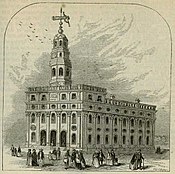摩爾門
外觀
| 本文屬於 |
| 後期聖徒運動 |
 |
| 系列的一部分 |
| 後期聖徒運動歷史 |
| 後期聖徒 · 摩爾門教 第一次異象 · 繼承危機 嘉德蘭安全會(銀行) |
| 後期聖徒運動共同經典 |
| 《聖經》(斯密約瑟譯本/靈感本) 《摩爾門經》 《教義和聖約》/《誡命書》 |
| 重要人物 |
| 斯密約瑟 · 考得里奧利佛 雷格登瑟耐 · 楊百翰 斯密約瑟三世 · 斯特朗雅各 三位證人 · 八位證人 |
| 早期官方刊物 |
| 《夜與晨星》 (1832-1833年) 《傳訊者和提倡者》(1834-1837年) 《長老期刊》 (1837-1838年) 《時代與季節》 (1839-1846年) |
| 建築物 |
| 鹽湖城聖殿 · 獨立城聖殿 嘉德蘭聖殿 · 納府聖殿 迦太基監獄 · 家譜圖書館 耶穌基督後期聖徒教會會議中心 約瑟·斯密紀念大廈 基督社區禮堂 |
| 相關教義 |
| 為死者洗禮 · 智慧語 · 恩道門 聖殿婚姻 |
| 機構 |
| 耶穌基督後期聖徒教會·十二使徒定額組(LDS) · 十二使徒定額組(CoC) 慈助會 · 七十員會長團 Intellectual Reserve公司 |
| 衝突 |
| 摩爾門戰爭 · 納府軍團 |
| 宗派分支 |
基督社區 基督的教會 (聖殿基地) 耶穌基督的教會 (比克頓派) 耶穌基督後期聖徒教會 (斯特朗派) 基本教義派的耶穌基督後期聖徒教會 殘餘的耶穌基督後期聖徒教會 有以利亞訊息的基督的教會 耶穌基督後期聖徒教會與基督社區差異 |
摩爾門(摩門,英文:Mormon)一詞與19世紀初美國人 Joseph Smith Jr.(小斯密約瑟)在美國紐約州開始的後期聖徒運動息息相關,這個運動造成了包括現在主導摩爾門教的耶穌基督後期聖徒教會在內的諸多宗派。小斯密約瑟於1830年出版《摩爾門經》。「摩爾門」是《摩爾門經》中的一個重要的地名,其中一位先知也以這地名取了「摩爾門」這個名字,《摩爾門經》的名字即是由先知摩爾門的名字而來,此外,《摩爾門經》中也有一部書叫做「摩爾門書」。
英文Mormon也常用來指稱相信摩爾門教的信徒。
來源
[編輯]約瑟斯密本人對 Mormon 這個字做了下面的註解,原文刊於《時代與季節》卷4第194頁,1843年5月15日,後由約瑟·斐亭·斯密編輯收錄於《先知約瑟·斯密的教訓》第299-300頁:[1]
- 『致《時代與季節》的編輯:先生:——透過您的報紙的媒介,我希望能夠更正在宣稱有受教育、自由和聰明人中間的一項錯誤;並且我高興地做這件事,因為我希望清楚思考和滿有理性的人很快地會聽見真理的聲音,而不是被無益的自作聰明的虛假做作帶入迷途。我要更正的錯誤是「Mormon」這個字的定義。有人宣稱這個字是從希臘文的「mormo」這個字衍生出來的。實情並非如此。在我透過神的恩惠翻譯出的《摩爾門經》的頁片上面沒有任何希臘文或拉丁文。讓那本書裡面的語言為自己說話。在第4版的第523頁,它寫到:『我們已照著我們所知道的,用那種在我們之中被稱為改良埃及文的字母寫下了這部記錄,這種文字是流傳下來,再由我們根據了我們的語言習慣而加以變更的。如果我們的片葉夠大的話,我們一定用希伯來文寫了;但是希伯來文也被我們變更過了;如果我們能用希伯來文寫了的話,你們在我們的記錄中就不會找到甚麼缺點了。但是主知道我們所寫的事情,也知道沒有別的民族知道我們的文字;所以他已預備了繙譯這記錄的工具。』在這裡這個議題可以安靜了,因為「沒有別的民族知道我們的文字」,所以在這個民族的人都死了以後 神(而不是人)要來翻譯。並且保羅也說:『世人憑自己的智慧、既不認識 神』,所以推論世界缺乏啟示;就像 神在祂無上的智慧中在地上無論何處總是給祂的聖徒同一靈,而這靈就像約翰所說的,是真正先知的靈,是見證耶穌的。我可以安全地說「Mormon」這個字是獨立於這個世代的認知和智慧。在我給個定義之前,讓我先說《聖經》廣義的說是「好」的意思;根據約翰福音救主說:『我是好牧人』;可以這麼說「好」這個字是日常用語中最重要常用的字。即使在不同的語言裡面有不同的拼寫方法,但是意思還是一樣的,總是對立於「不好」這個字。我們可以用撒克森語說「good」;丹麥語說「god」;哥特語說「goda」;德語說「gut」;荷蘭語說「goed」;拉丁語說「bonus」;希臘語說「kalos」;希伯來語說「tob」;埃及語說「mon」。所以,在前面加個「more」(更)或者縮寫「mor」,我們就有了這個字「mormon」,照字面上的意思就是「更好」的意思。您的,約瑟斯密。』
參見
[編輯]註腳
[編輯]- ^ 原文:To the Editor of the Times & Seasons: Sir:--Through the medium of your paper, I wish to correct an error among men that profess to be learned, liberal and wise; and I do it the more cheerfully, because I hope sober-thinking and sound-reasoning people will sooner listen to the voice of truth, than be led astray by the vain pretensions of the self-wise. the error I speak of, is the definition of the word "Mormon." It has been stated that this word was derived from the Greek word "mormo." This is not the case. There was no Greek or Latin upon the plates from which I, through the grace of God, translated the Book of Mormon. Let the language of that book speak for itself. On the 523rd page, of the fourth edition, it reads: "And now behold we have written this record according to our knowledge in the characters, which are called among us the "Reformed Egyptian," being handed down and altered by us, according to our manner of speech; and if our plates had been sufficiently large, we should have written in Hebrew: but the Hebrew hath been altered by us, also; and if we could have written in Hebrew, behold ye would have had no imperfection in our record, but the Lord knoweth the things which we have written, and also, that none other people knoweth our language; therefore he hath prepared means for the interpretation thereof." Here then the subject is put to silence, for "none other people knoweth our language," therefore the Lord, and not man, had to interpret, after the people were all dead. And as Paul said, "the world by wisdom know not God," so the world by speculation are destitute of revelation; and as God in his superior wisdom, has always given his Saints, wherever he had any on the earth, the same spirit, and that spirit, as John says, is the true spirit of prophecy, which is the testimony of Jesus. I may safely say that the word Mormon stands independent of the learning and wisdom of this generation.--Before I give a definition, however, to the word, let me say that the Bible in its widest sense, means good; for the Savior says according to the gospel of John, "I am the good shepherd;" and it will not be beyond the common use of terms, to say that good is among the most important in use, and though known by various names in different languages, still its meaning is the same, and is ever in opposition to "bad." We say from the Saxon, "good"; the Dane, "god"; the Goth, "goda"; the German, "gut"; the Dutch, "goed"; the Latin, "bonus"; the Greek, "kalos"; the Hebrew, "tob"; and the "Egyptian, "mon." Hence, with the addition of "more," or the contraction, "mor," we have the word "mormon"; which means, literally, "more good." Yours, JOSEPH SMITH.
